Open Source
By Mike Gifford
on 06/06/2020
I had the pleasure of being interviewed by Richard Pietro as part of his Stories from the Open Gov podcast. Richard has gotten some amazing speakers on his show including Sir Nigel Shadbolt, Ashley Casovan, Nathaniel Heller, Melanie Robert, Rob Davidson, Tony Clement, Michael Geist, Lindsey Marchessault, Ryan Androsoff, Tracey Lauriault, Keith Loo, and Jesse Hirsh. You should subscribe to the podcast and listen to it on SoundCloud. We talk about a range of things here from accessibility to open government and open source, I hope you find it interesting.
I was encouraged by Ioanna Talasli ...
I had the pleasure of being interviewed by Richard Pietro as part of his Stories from the Open Gov podcast. Richard has gotten some amazing speakers on his show including Sir Nigel Shadbolt, Ashley Casovan, Nathaniel Heller, Melanie Robert, Rob Davidson, Tony Clement, Michael Geist, Lindsey Marchessault, Ryan Androsoff, Tracey Lauriault, Keith Loo, and Jesse Hirsh. You should subscribe to the podcast and listen to it on SoundCloud. We talk about a range of things here from accessibility to open government and open source, I hope you find it interesting.
I was encouraged by Ioanna Talasli ...
on 18/03/2019
1. About
Celebrating 100 years in 2018, the Canadian National Institute for the Blind (CNIB) Foundation is a non-profit organization driven to change what it is to be blind today. CNIB delivers innovative programs and powerful advocacy that empower people impacted by blindness to live their dreams and tear down barriers to inclusion. CNIB’s work as a blind foundation is powered by a network of volunteers, donors and partners from coast to coast to coast. The CNIB Foundation, Vision Loss Rehabilitation Canada and CNIB Deafblind Community Services make up the CNIB Group.
2. Facts
CNIB...
1. About
Celebrating 100 years in 2018, the Canadian National Institute for the Blind (CNIB) Foundation is a non-profit organization driven to change what it is to be blind today. CNIB delivers innovative programs and powerful advocacy that empower people impacted by blindness to live their dreams and tear down barriers to inclusion. CNIB’s work as a blind foundation is powered by a network of volunteers, donors and partners from coast to coast to coast. The CNIB Foundation, Vision Loss Rehabilitation Canada and CNIB Deafblind Community Services make up the CNIB Group.
2. Facts
CNIB...
By Mike Gifford
on 05/11/2018


I had the pleasure of being on AXSChat talking about web accessibility and Drupal in October. It was actually a two stage process as Neil Milliken and Antonio Santo had a really fun video conversation on the Friday before. Unfortunately, Debra Ruh was not able to join us for the video discussion. That was captured and captioned and uploaded on the weekend. Then on Tuesday, October 23rd, we had an hour long Twitter discussion flooding the Twitterverse with questions about accessibility using the hashtag #axschat. You can watch the video here:
But thought that it might be interesting to...
But thought that it might be interesting to...
By Mike Gifford
on 04/11/2018
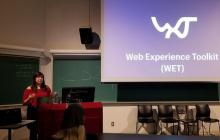

Derek Alton wrote a tweet in the middle of October that caught my eye and got me to come up with some suggestions. "Moment of frustration: I love bringing people who I think are inspiring together to do fun shit that they could not do on their own. Right now I feel like I have been bringing people together to talk when what I really want to do is bring people together to act, to do!"
I think of myself as a rather pragmatic guy so I suggested 10 tangible things that the GC can do. This is a cleaned up version of what I tossed up on Twitter.
Seems super simple & easy, but sponsor Open...
I think of myself as a rather pragmatic guy so I suggested 10 tangible things that the GC can do. This is a cleaned up version of what I tossed up on Twitter.
Seems super simple & easy, but sponsor Open...
By Mike Gifford
on 16/10/2018
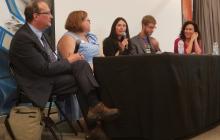

The Government of Canada (GC) hosted Open First Day on Friday, September 28. It was a really interesting opportunity for hundreds of people in public/private sector to get together and share their experiences.
I’d like to start by congratulating them on the title of the event. It wasn’t Consider Open Source Day or Learn about Open Source and Government Day. It Was Open First Day. Open Standards, Open Data, Open Source and Open Government.
The site for this conference was also forward thinking as it was all built on GitHub. More and more government microsites are hosted on GitHub...
I’d like to start by congratulating them on the title of the event. It wasn’t Consider Open Source Day or Learn about Open Source and Government Day. It Was Open First Day. Open Standards, Open Data, Open Source and Open Government.
The site for this conference was also forward thinking as it was all built on GitHub. More and more government microsites are hosted on GitHub...
By Mike Gifford
on 01/06/2018
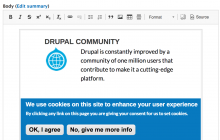

After writing this article I learned about IBM’s Content Clarifier from Hassell Inclusion. Something like this could be built right into the workflow of your content creation process.
Accessibility (a11y) and Search Engine Optimization (SEO) is complex, but it doesn't have to be hard. If you have a good routine in place, you can write content that can be compelling for everyone.
So much can come down to the KISS Principle "Keep it simple, stupid". Like everything else in life, there are a lot of exceptions. Much comes down to doing your best to learn how to do it better. I have included some...
Accessibility (a11y) and Search Engine Optimization (SEO) is complex, but it doesn't have to be hard. If you have a good routine in place, you can write content that can be compelling for everyone.
So much can come down to the KISS Principle "Keep it simple, stupid". Like everything else in life, there are a lot of exceptions. Much comes down to doing your best to learn how to do it better. I have included some...
By Mike Gifford
on 27/05/2018


The GDPR is in effect. The General Data Protection Regulation (GDPR) (EU) 2016/679 is a regulation in EU law that is now in effect. This affects all organizations that service European citizens. In North America, most organizations only became aware of it recently.
The policies of the GDPR are quite broad and establish a bold Privacy by Design framework. Ann Cavoukian published the 7 Foundational Principles of privacy nearly a decade ago. At the time she was the Information and Privacy Commissioner of Ontario. Since this time the amount of personally identifiable information (PII) has...
The policies of the GDPR are quite broad and establish a bold Privacy by Design framework. Ann Cavoukian published the 7 Foundational Principles of privacy nearly a decade ago. At the time she was the Information and Privacy Commissioner of Ontario. Since this time the amount of personally identifiable information (PII) has...
By Mike Gifford
on 11/05/2018
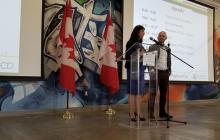

Everybody wants their website to be accessible. Information and Communication Technologies (ICT) is key for any modern organization. In the Government of Canada, it is a clear part of the Liberal Party's mandate. Setting a strong policy direction is critical, but then what?
Most departments still see accessibility as a one-liner that can be added to an ICT contract. Then the responsibility for any shortfalls lies on the vendor.
Sadly, this doesn't work. Accessibility is a journey, not a destination.
Web accessibility is complicated, the ecosystem and use cases change over time. So what can...
Most departments still see accessibility as a one-liner that can be added to an ICT contract. Then the responsibility for any shortfalls lies on the vendor.
Sadly, this doesn't work. Accessibility is a journey, not a destination.
Web accessibility is complicated, the ecosystem and use cases change over time. So what can...
By Mike Gifford
on 09/05/2018


The tech sector has undermined personal privacy in the constant pursuit of the latest shiny thing. Privacy is a core component of our democracy and is essential for free expression.
Most have assumed that it is built into the online tools that they use every day. This isn't the case. The media coverage of Cambridge Analytica and Facebook how dangerous this is. The model of surveillance capitalism put forward by Google is now very advanced. Big Data & Artificial Intelligence gives businesses more insights than Big Brother dreamed possible.
Many people are coming to the realization that...
Most have assumed that it is built into the online tools that they use every day. This isn't the case. The media coverage of Cambridge Analytica and Facebook how dangerous this is. The model of surveillance capitalism put forward by Google is now very advanced. Big Data & Artificial Intelligence gives businesses more insights than Big Brother dreamed possible.
Many people are coming to the realization that...
By Mike Gifford
on 18/12/2017
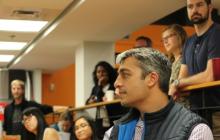

I have been very encouraged by the growth of Open Government initiatives around the world. It’s done so much to help make governments more agile, responsive, accessible and affordable. Success of this model depends on a community of contributors, most of who who lie outside of government. This means that they also fall outside of the hierarchical chain of command.
How the public sector engages with that community may well determine how effective these initiatives are.
Supporting contributors
Governments don’t have either the mechanism or capacity to give money to people who contribute good...
How the public sector engages with that community may well determine how effective these initiatives are.
Supporting contributors
Governments don’t have either the mechanism or capacity to give money to people who contribute good...
